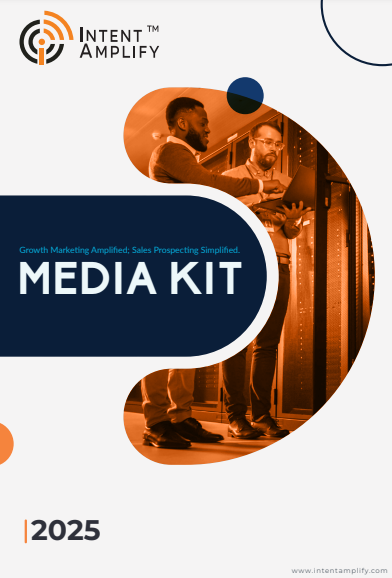
The Role of Content Marketing in B2B Demand Generation
- Last updated on: May 14, 2024
https://intentamplify.com/blog/b2b-demand-generation-strategies/Did you know that 32% of B2B demand generation marketers use dynamic personalized content on their websites and emails to connect with the right leads? When data comes into the picture, content-driven demand generation improves the customer experience.
Understanding Demand Generation
When it comes to creating customers for your B2B brand, you’re likely going to run into the term “demand generation.” To put it straight, demand generation is a marketing process used to increase awareness of your product, or more simply generate demand. This is a stage before lead generation where you’re focusing more on putting your brand in places where customers can start to understand what you offer. The eventual goal of demand generation is to generate leads for your product or service. Think of it as branding – you do not directly promote your product or service but rather advertise it to make its existence known.
The Importance of Strong Content
We know that a good advertisement is a result of strong and appealing content. Not just that, the content should reach the audience from all of the channels where they are likely to engage. Content marketing for B2B demand generation is all about that and more.
Read more about B2B Digital marketing tactics for lead generation
What is content marketing in B2B demand generation?
Content is the fuel, data is the infrastructure, and alignment is the key to successful B2B demand generation. As a B2B marketer, generating demand for your products or services is critical to your business’s success. Content marketing stands as one of the top ways to generate demand.
Creating good content is the first step, sharing it through various marketing channels and being consistent, helps attract and retain a clearly defined audience. The ultimate goal of content marketing is to convince customers that they can get value from your offering!
Why content marketing matters for demand generation in B2B
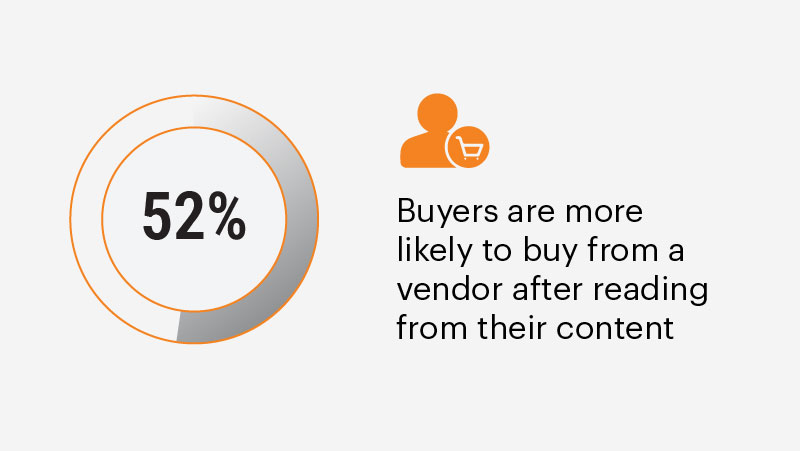
Educating the Audience:
In the B2B space, purchases are often complex and involve multiple decision-makers. Content marketing allows businesses to provide valuable information and insights to potential customers, helping them understand the industry, challenges, and solutions. By educating the audience, businesses can build trust and credibility, essential for generating demand.
Establishing Thought Leadership:
Content marketing enables B2B companies to showcase their expertise and thought leadership in their respective industries. By consistently publishing high-quality content such as whitepapers, case studies, and expert insights, businesses can position themselves as authorities in their field. This, in turn, attracts prospects and generates demand as customers are more likely to engage with and buy from companies they perceive as leaders.
Addressing Pain Points and Challenges:
Effective content marketing identifies and addresses the pain points, challenges, and needs of the target audience. By creating content that resonates with the specific problems faced by their potential customers, B2B businesses can capture their attention and demonstrate how their products or services can provide solutions. This relevance and alignment with customer needs are essential for driving demand.
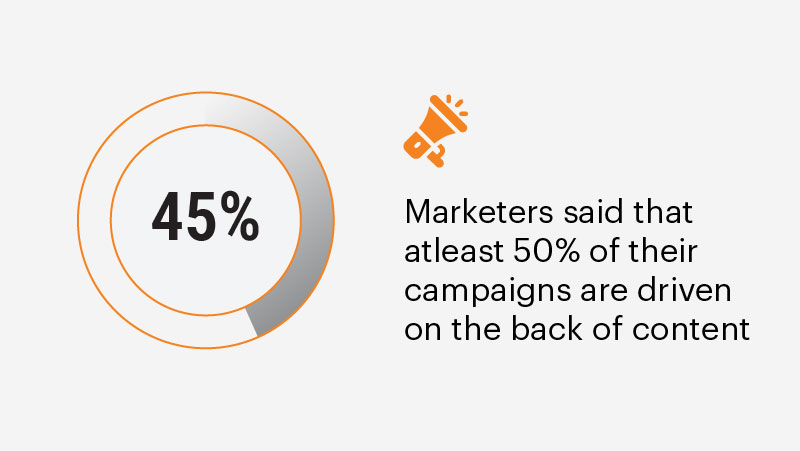
Nurturing Leads through the Sales Funnel:
B2B sales cycles are typically longer, involving multiple touchpoints and interactions before a purchase decision is made. Content marketing provides valuable assets at each stage of the buyer’s journey, from awareness to consideration to decision-making. By delivering the right content to the right audience at the right time, businesses can nurture leads effectively and guide them through the sales funnel, ultimately converting them into customers.
Supporting Account-Based Marketing (ABM):
Content marketing complements account-based marketing (ABM) strategies. ABM tactics have become very popular among B2B demand-gen marketers. By creating personalized and targeted content for specific accounts or industries, B2B companies can engage key stakeholders within their target accounts, aligning content with the needs and interests of each account. This personalized approach enhances the effectiveness of demand-generation efforts and strengthens relationships with prospects.
Practicing content marketing for B2B demand generation educates the audience, establishes thought leadership, addresses pain points, nurtures leads, and supports account-based marketing initiatives. By delivering valuable and relevant content, B2B businesses can attract, engage, and convert prospects into customers effectively.
The Role of Content Marketing in Driving B2B Demand: Best Practices
Know the pulse of your audience:
Every marketing effort starts with understanding and defining an ideal customer. Before creating any content, it’s crucial to have a serious understanding of your target audience. For that, you can use primary and secondary market research, analyze buyer personas, and identify their pain points, challenges, and preferences. Tailor your content to address their specific needs and interests.
Be honest and create good value content:
Your content should provide genuine value to your audience. Whether it’s informative articles, case studies, how-to guides, or industry reports, it matters to the audience that your content is relevant and insightful to them so that the perceived value can prompt them to take some action by the end of it. It’s a truly intuitive approach, you solve their problems, answer their questions, and offer practical solutions, and then wait and watch!
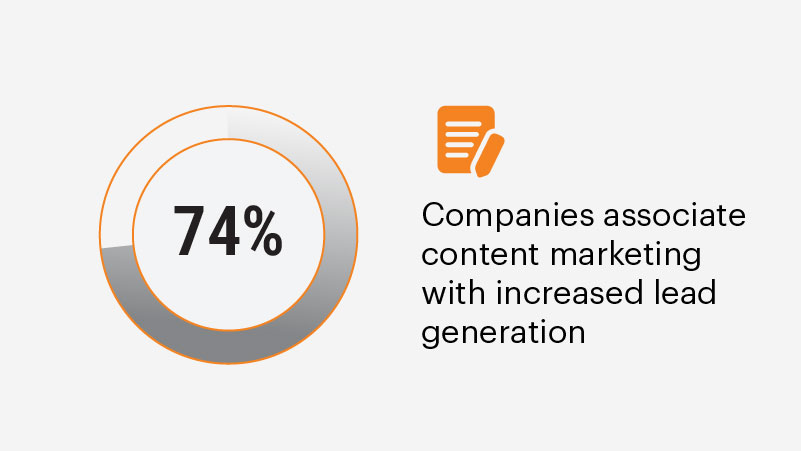
Keep posting in a rhythm:
The power of consistency applies to all aspects of life and business and certainly is a key to successful content marketing for B2B demand generation. Develop a content calendar and stick to a regular publishing schedule. Whether it’s daily, weekly, or monthly, consistency helps build trust and keeps your audience engaged. Additionally, maintain consistency in your brand voice, style, and messaging across all content channels.
Optimize for Search Engines:
Adapt search engine optimization (SEO) best practices into your content strategy to improve visibility and attract organic traffic. Conduct keyword research to identify relevant terms and phrases your audience is searching for, and optimize your content accordingly. This includes using keywords strategically in titles, headings, meta descriptions, and throughout the content.
Promote Across Multiple Channels:
Don’t rely solely on organic traffic to drive demand for your content. Promote your content across multiple channels, including social media, email newsletters, industry forums, and influencer networks. Utilize paid advertising, such as pay-per-click (PPC) campaigns or sponsored content, to reach a broader audience and amplify your message.
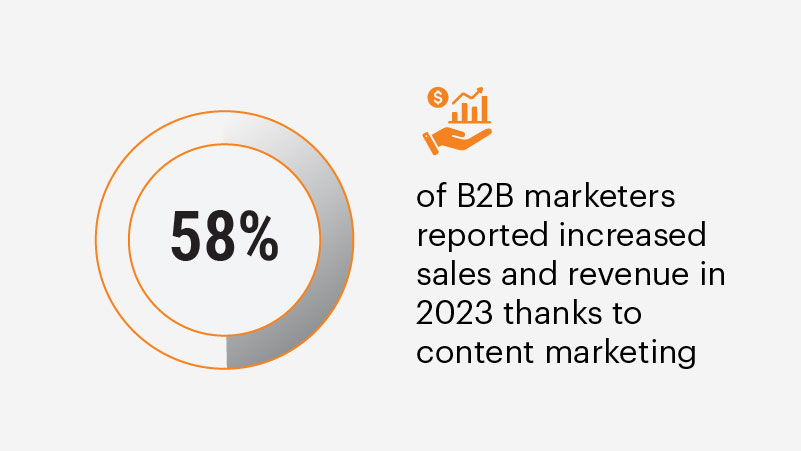
Encourage Engagement and Sharing:
Foster engagement with your audience by encouraging comments, shares, and likes on your content. Ask questions, solicit feedback, and invite discussions to stimulate interaction and build a technology or service-focused community of influencers and GTM experts.
Make it easy for readers to share your content by including social sharing buttons and calls-to-action (CTAs).
Measure and Analyze Performance:
Track key metrics to evaluate the effectiveness of your content marketing for B2B demand generation efforts. Monitor metrics such as website traffic, engagement, conversion rates, and ROI to understand what’s working and what needs improvement. Use analytics tools like Google Analytics, social media insights, and marketing automation platforms to gather data and refine your strategy based on requirements.
Continuously Optimize and Iterate:
Content marketing is an ongoing process that requires continuous optimization and iteration. Use insights from your performance metrics, feedback from your audience, and industry trends to refine your content strategy over time. Experiment with different formats, topics, and distribution channels to discover what resonates best with your audience and drives the most demand.
Follow these best practices to effectively leverage content marketing and drive strong demand for your B2B products or services. With B2B digital marketing tactics, you can attract qualified leads, and ultimately grow your business.




